Mastering Restaurant Sanitizing: Best Practices for Kitchens and Dining Areas
Master restaurant sanitizing with clear steps for kitchens and dining areas. Learn methods, checklists, and procedures to keep your team safe and...
The food service industry is a vital part of a community as it offers diverse value.
Since the beginning of human history, people have come together over food. The food service industry continues to be a testament to the role food plays — in cultures, economies, and around tables.
Let's explore the ins and outs of the food service industry and learn about who and what keep it running safely.
WHAT WE'LL COVER:
The definition of "food service" refers to the preparation, handling, packaging, and distribution of food, beverage, and related services by an establishment. This industry mainly involves different types of industries, such as restaurants, cafes, bars, cafeterias, catering companies, and institutional food providers.
Food service is otherwise known as catering. It is an essential sector of a community that makes up a significant percentage of a country's economy. This sector provides daily food products, services, niche requirements, and similar services to members of the community.
Food safety agencies define food service as any facility that serves meals and snacks for immediate consumption or food away from home. Food retailers are also part of this sector.
Food service providers aim to deliver quality food and services to the community while adhering to established laws and codes on food safety.

Centralized food service, otherwise termed the commissary food system, is a type of food service system where food is prepared and distributed from a central location. Central facilities produce large batches of food to redistribute to smaller facilities.
The centralized food service system is often applied in institutions such as hospital cafeterias, schools, and care centers. This type of system provides efficiency in producing large quantities of food. It also provides assurance in maintaining quality and safety and makes management more efficient as there is only one location to monitor.
In this section, we also discuss the following topics:
The food service industry involves several different businesses with varying natures of services, but all serving food and beverage.
The food service industry generates a significant amount of revenue for a country and provides business opportunities and employment to its citizens. The industry provides leisure, convenience, and health requirements to all the members of a community.
The industry aims to provide consumers with high-quality food, beverage, and services that satisfy their personal and nutritional requirements. As such, the food service industry moves toward the direction of what consumers want while considering the environment, economic climate, and other critical factors.
The contributions of the foodservice industry to the global economy cannot be more emphasized. In 2021, the industry was valued at $2,323.29 billion.
The industry provides countless employment opportunities to individuals. In the U.S., the foodservice industry employs approximately 15.6 million workforces. This estimation accounts for 10.5% of the total U.S. employment. The U.S. food industry is estimated to be well over $1.5 trillion, which is roughly 4% of the country's total GDP.
In the U.K., the food and drink service sector is valued to be approximately $73 billion. The sector employs approximately 4.2 million food service workers in the U.K.
The foodservice industry all over the world connects different sectors together. The supply chain keeps businesses, such as fresh food production, food retail sale, and food distribution programs, afloat and provides several opportunities for people.
The sector helps bridge the gap of food insecurity and ensures access to consumer demands and options. These contributions come with their commitment to serve only safe food and quality products and protect public health from food safety hazards.
We've compiled a list of more food service industry statistics.
The agencies which enforce food safety in a restaurant or foodservice operation are national, state, and local government food safety agencies.
They are responsible for creating food laws and regulations that aim to create food standards for food preparation, provide nutritious food, and protect public health from foodborne illnesses. Food safety agencies emphasize how food regulations are important for protecting public health.
The scope and limitation of each agency's authority over the industry practices vary from one country to another. In one nation, there may be more than two food safety agencies, whereas there are countries that have one agency with the sole responsibility of regulating the food service sector.
In the U.S., the food service industry is mainly regulated by three government agencies (including the FDA and USDA):
In the U.K., food safety agencies are not divided into different departments.
In both countries, federal agencies coordinate with local and state health departments to implement food safety laws. They are responsible for ensuring compliance among food businesses and reporting to federal agencies regarding food safety issues. Local health agencies also monitor health code violations.
All food safety and health agencies work toward protecting public health and helping food businesses work seamlessly.
Read more about the roles and responsibilities of food and health agencies in different countries here.
In the U.S., the FDA creates recommendations on food safety operations that are regularly compiled and updated under the Food Code. These recommendations are adapted throughout different states and are enforced as laws and regulations. They cover a wide range of food safety operations, including receiving, handling, storing, preparing, cooking, and cleaning in food businesses.
As previously mentioned, in the U.K., food safety laws are enforced by the Food Standards Agency. The agency enforces laws established in the Food Safety Act of 1990. In addition to this main law, the FSA makes suggestions for amendments and new regulations based on the extensive information that it gathers from local health departments.
Every year, the food service industry is evolving. Whether it is in size, innovation, or complexity of operations, choices of food and services from food businesses grow wider each year. Customer demands, technological innovations, and the current state of health and safety often drive changes and trends.
Some of the most recent trends in food service include the following:

These are just some of the current trends in food industry. As consumer preferences and market dynamics continue to evolve, food service establishments need to stay agile and adapt to these trends to remain competitive and meet the changing demands of their customers.
Read more about the latest food safety trends in the food industry.
The food service industry is an indispensable part of any country's ecosystem. The industry provides services that contribute to the economic, social, environmental, and cultural aspects and lifestyle of a community.
Specifically, the food service industry provides every nation with the following benefits:
When properly regulated, the food service industry becomes an invaluable component of a nation's growth. Its contributions to the community help enhance the consumer's way of living, preserve traditions, and stimulate economic growth.
In this section, we will discuss the following topics on skills and food service equipment:
The food service industry gathers people with different expertise related to food preparation and service. Food service professionals and business entrepreneurs all gather in this sector to create a working and efficient food service industry.
You can see in this industry a wide range of skills, innovative products, and equipment. Experts in food safety and hygiene, customer service, planning, accounting, innovation, presentation, and inventors collaborate to make the food service industry.
With these critical skills and restaurant equipment in place, the food service industry can thrive, delivering delicious meals, ensuring food safety, providing excellent customer service, and contributing to the overall success of food businesses.
Below, we discuss more on what critical food service skills and equipment are essential for a food service business.
The food service industry requires a specific set of skills and competencies for a business to survive. This industry is filled with tough competition, and only the most efficient and effective workers flourish.
Employees in the food service sector must have the following skills:
Food service skills can be categorized as entry-level, skilled, and supervisory. This categorization depends on the expertise of an employee or food service operator and can be further improved upon through training and experience.

In addition to a community of different experts as part of the food service workforce, the food service industry house several unique pieces of commercial equipment. These pieces of food processing equipment often come in industrial size and can produce more yield than the common household food prep tools.
Food service equipment helps in making food handling tasks more efficient, precise, and accurate all the time in the restaurant industry. Some of the essential restaurant equipment list that every food service business must have includes the following:
These common equipment and kitchen tools are all food service essentials. Some types of food service facilities may require more specialized versions of tools and restaurant supply products to emphasize particular attributes.
Commercial restaurant appliances make the jobs of food service workers easier. They are also designed to make fewer mistakes and preserve the quality and safety of foods for consumers.
Food service and kitchen supplies include a wide range of products and equipment used in this industry to help in the preparation, presentation, and delivery of food. Supplies make up the products served to consumers. They are the tools used to prepare the food and the ingredients that make up the food.
Food service supplies come from different related businesses. Some supplies are staples for all types of food service businesses, whereas some are unique or even exclusive to some operations.
The following are considered food prep supplies:
A food service business cannot run without supplies. These tools and materials are required to operate smoothly and provide the customers with what they need.
Other innovative restaurant supplies are essential to maintain food safety, contributing to the overall success and compliance of a food service business. High-quality restaurant supplies can help businesses achieve their goals faster.
Food service distributors are third-party entities that supply or deliver food and non-food products to food service establishments. These restaurant food distributors act as a bridge between manufacturers and food service businesses. They help make various products and services accessible to other food service businesses, including restaurants, retail stores, convenience stores, and other independent companies in the food service industry.
Food service distributors procure and purchase products and services from a wide range of growers, manufacturers, and other suppliers and then redistribute them to other businesses. The extensive product list and services redistributed by food service distributors range from perishable food items to outsourcing services, such as menu planning, culinary support, and training programs.
The contributions of food service distributors in the food service industry allow for a consistent supply of food products and services.
Independent food distributors can help businesses sustain their supply of ingredients, products, and services. Distributors ensure that there is no gap in the supply chain for continuous operation.
In particular, the main functions of food service distributors are the following:
A food distribution company serves as a one-stop shop and intermediary between food manufacturers or producers and end customers, ensuring that products are efficiently delivered to their intended destinations. Their expertise in providing business food solutions and managing the complexity of the supply chain helps streamline operations, optimize inventory levels, and provide value-added services to customers.
The food service industry consists of several different food businesses. Each food company may differ in the target market, the services offered, objectives, and applicable regulations. The food businesses in this industry are divided into two categories, namely:
The categorization of businesses in the food service industry help in understanding their unique characteristics. Both segments aim to provide food and beverage, but they have their own goals and dynamics.
Below, we discuss each segment in detail.
Non-commercial food service refers to businesses that provide food and beverage in different institutions to support their main functions. This segment of the food service industry does not put profit-making as its primary goal. Instead, they provide food and services to fulfill social needs.
The non-commercial segment of the food service industry uses a not-for-profit model to serve its customer base, which includes students, patients, and employees inside a particular institution. That being said, common examples of non-commercial food services include the following:

In terms of pricing, non-commercial food service businesses have less flexibility. They are commonly regulated by the institution they are operating under. This regulation may also include dietary requirements regarding the foods they serve.
Non-commercial businesses undergo stricter guidelines regarding the food they serve, especially for health-related institutions. For example, food service cafeterias in schools are often bound under the approved school nutrition standards.
Commercial food service businesses are typical food facilities. They primarily operate to make a profit by serving food and beverage to consumers. Commercial businesses are commonly privately owned and makeup 80% of the entire food service industry.
Common examples of commercial food service businesses include:
The food and services offered by commercial food service businesses are greatly affected by food trends, consumer demand, and competition. In addition to the food they offer, they also use unique themes and dining experiences as selling points.
Commercial businesses serve a significantly wider range of customers. They often focus on creating a pleasant dining experience, building customer loyalty, and attracting repeat business. This food service segment is subject to regulations, including licensing, labor, sanitation, food safety, services, and other industry regulations.

Both segments of the food service industry are mandated to follow food safety regulations. Whether the business is profit or non-profit oriented, the food business must ensure that all served products will not cause any food safety issues. It is part of the food service manager's responsibility to ensure that their team has a solid approach to food safety.
A food service manager is a critical part of a food business' organizational chart. They are responsible for overseeingand controlling food operations and ensuring safe food working conditions. A manager's job may go beyond just managing their team. It also includes financial planning, menu development, strategizing marketing plans, and ensuring food safety compliance.
To prove competence, a food service manager is expected to have Food Service Manager Certification. The certification process involves undergoing food safety training, education, and extensive evaluation to develop the necessary skills for managing a food service business. The topics involved in this process include understanding food safety, managing employees, and strategizing to grow your business.
A manager certification is often a requirement or recommendation by local or federal food safety agencies. Having a certified officer each shift is a critical part of ensuring food safety compliance for any food service business.
A manager certification is generally valid for most states in the U.S. for five years. Managers must undergo refresher courses or additional training to renew this certificate. The amount of time before the certification renewal is enough to collect new trends and advancements in managing food service businesses.
A food service director, otherwise known as the food service manager, is responsible for ensuring that the entire food service operation is running as planned. The director is given the task of managing and connecting the different departments of a food service business and finding ways to grow the business.
Some of the core roles of a food service director include the following:
The food service director is not only expected to manage the business. They are also expected to formulate strategies that will help improve business performance while maintaining compliance with regulations.

A food service consultant is a highly trained and knowledgeable expert on all things about the food service industry. They have an extensive understanding and hands-on experience in the food service industry and are expert customer service professionals. The role of a consultant or foodservice professional is to provide food service establishments with valuable information on food safety regulations, basic operations, efficiency improvement, and how to achieve the set goals.
A food service consultant conducts an operational assessment of your food service routines and will help determine gaps. According to their assessment, your team will receive a comprehensive review and an appropriate strategy and plan to improve your foodservice operations.
Food service consultants help directors and food service owners in improving different aspects of the business. Different consultants may have different expertise.
Regardless of the food service segment to which your business belongs, you and your team are required to comply with food safety regulations. This aspect makes sure that your business will not cause any harm to public health while serving high-quality food and services.
The importance of food safety in a food service business is invaluable. It is an essential aspect of a business needed to continue operating.
The following are general and basic, yet critical, food safety rules for compliance:
Food safety is a critical component of the food service industry, in addition to serving great-tasting food. The best way to ensure public health through compliance is to implement a food safety management system.
At FoodDocs, we take compliance one step further. Our system combines the efficiencies and innovative solutions of artificial intelligence and a machine-learning program with food service operations and monitoring.
By simply describing your business to our system, you can automatically get smart food service solutions, such as a Traceability System, digital monitoring logs, and a real-time dashboard for maintaining compliance.
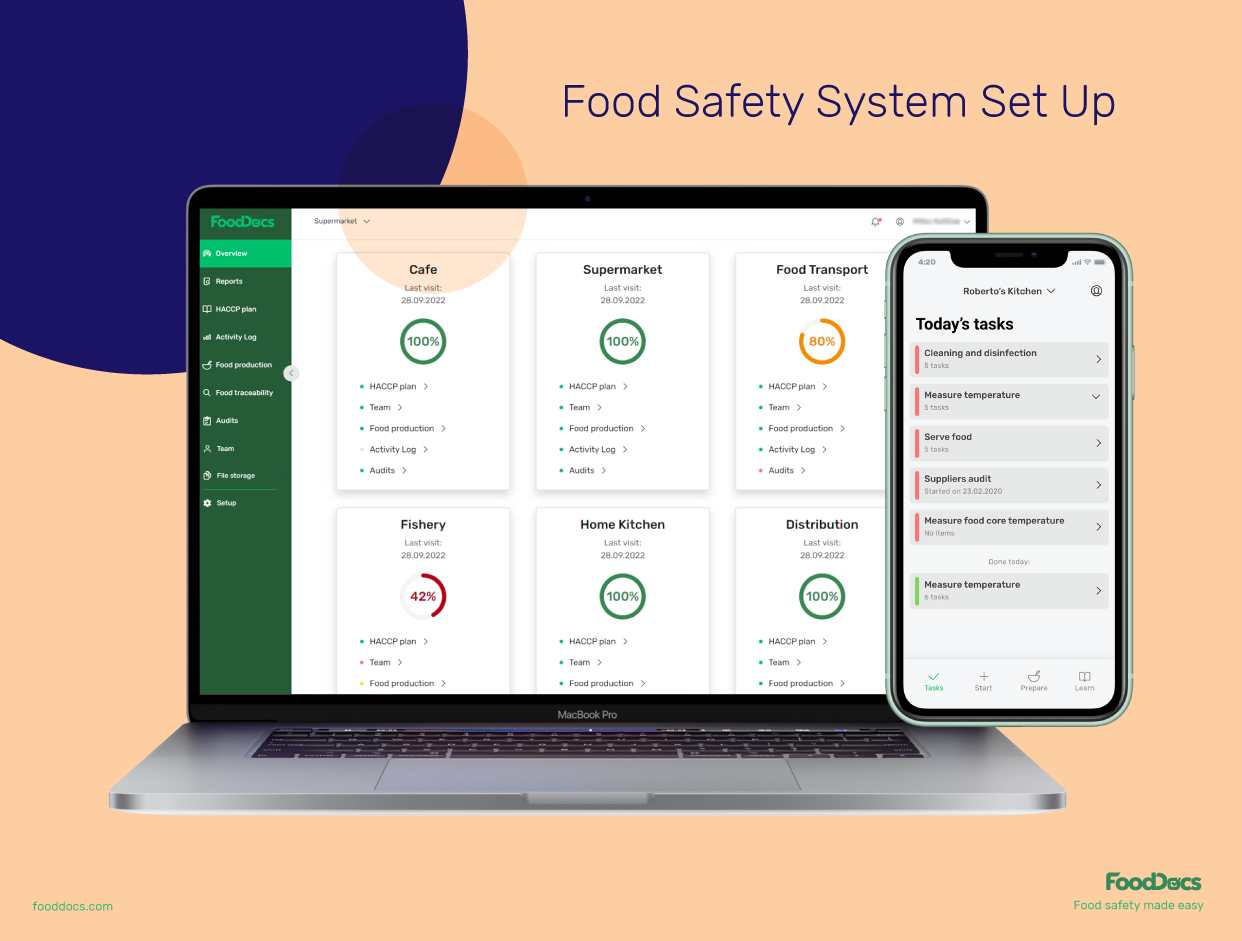
In every food service business, food safety is critically important. Protecting customer health and compliance with food safety regulations are jobs that come with food service. Right before opening a food service business, owners and managers must think ahead of strategies and concrete plans on how to stay compliant.
This this day, many businesses still use a pen-and-paper method. This method is very prone to errors, tampering, and oversight. As a smart solution, our team of food safety experts developed our smart Food Safety Management System at FoodDocs.
Using our smart software, you can efficiently ensure food safety compliance with the following features and benefits:
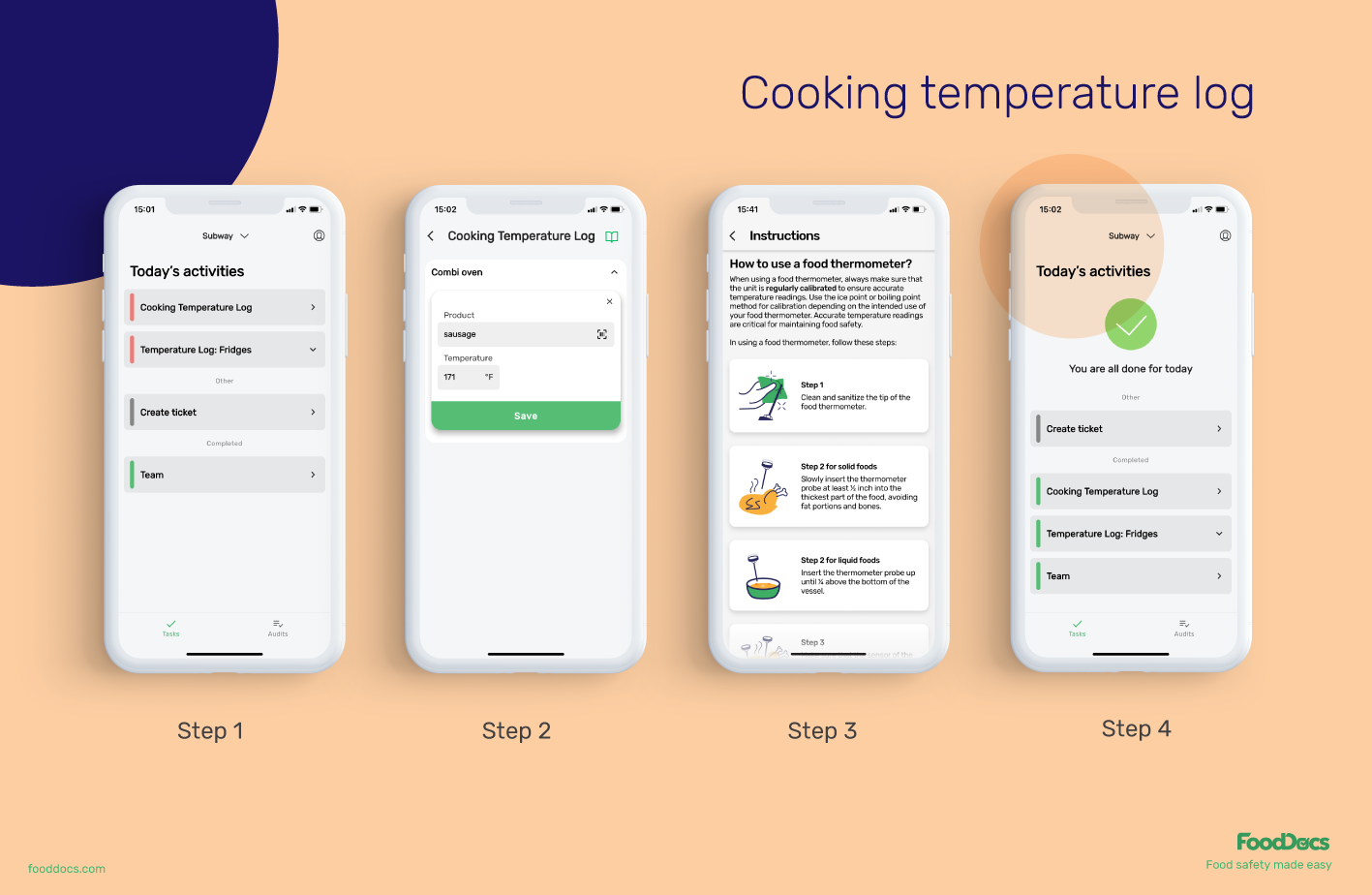
Cooking temperature log from FoodDocs
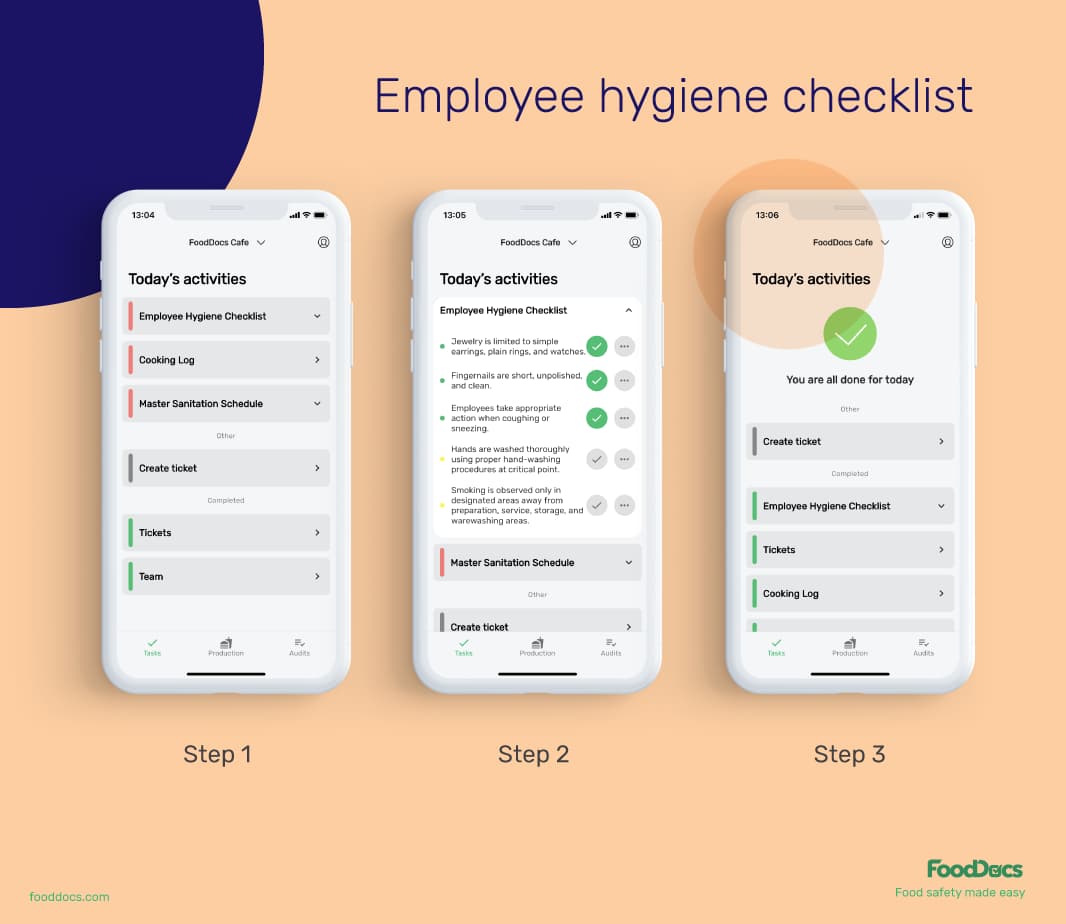
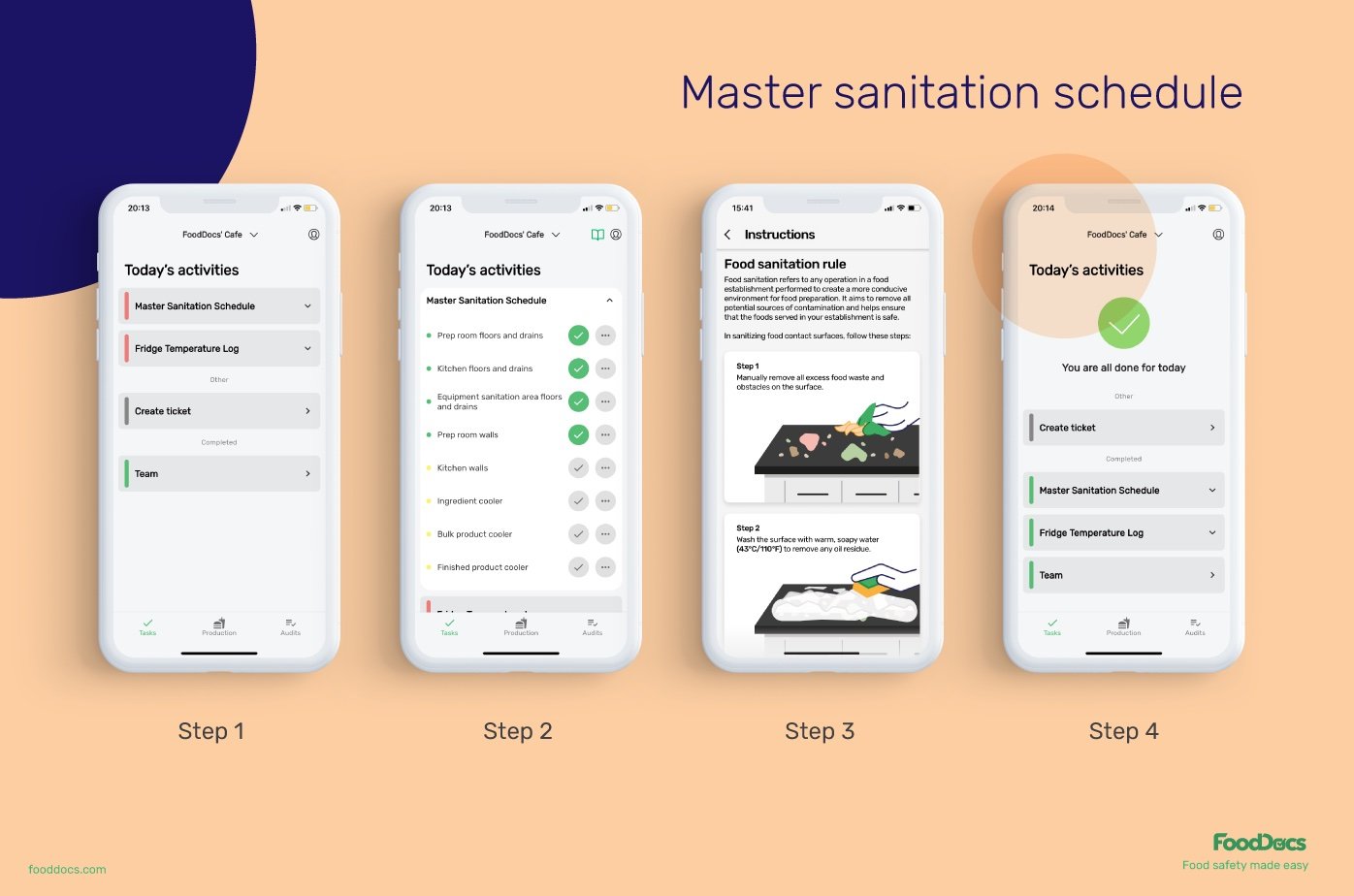
Master sanitation schedule from FoodDocs
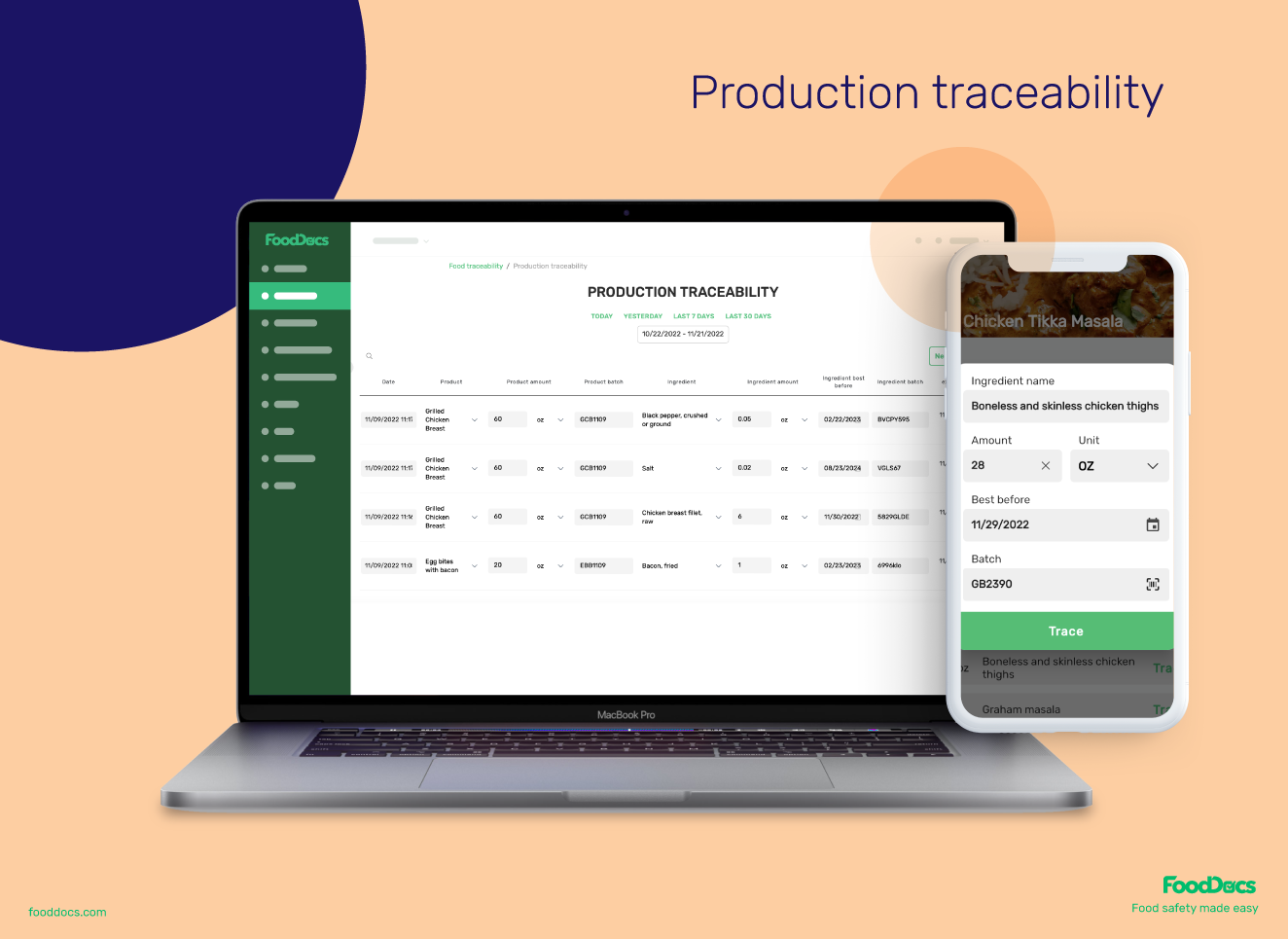
Production Traceability System from FoodDocs
Improve your management productivity and efficiency with the following features from our smart Food Safety Management System.
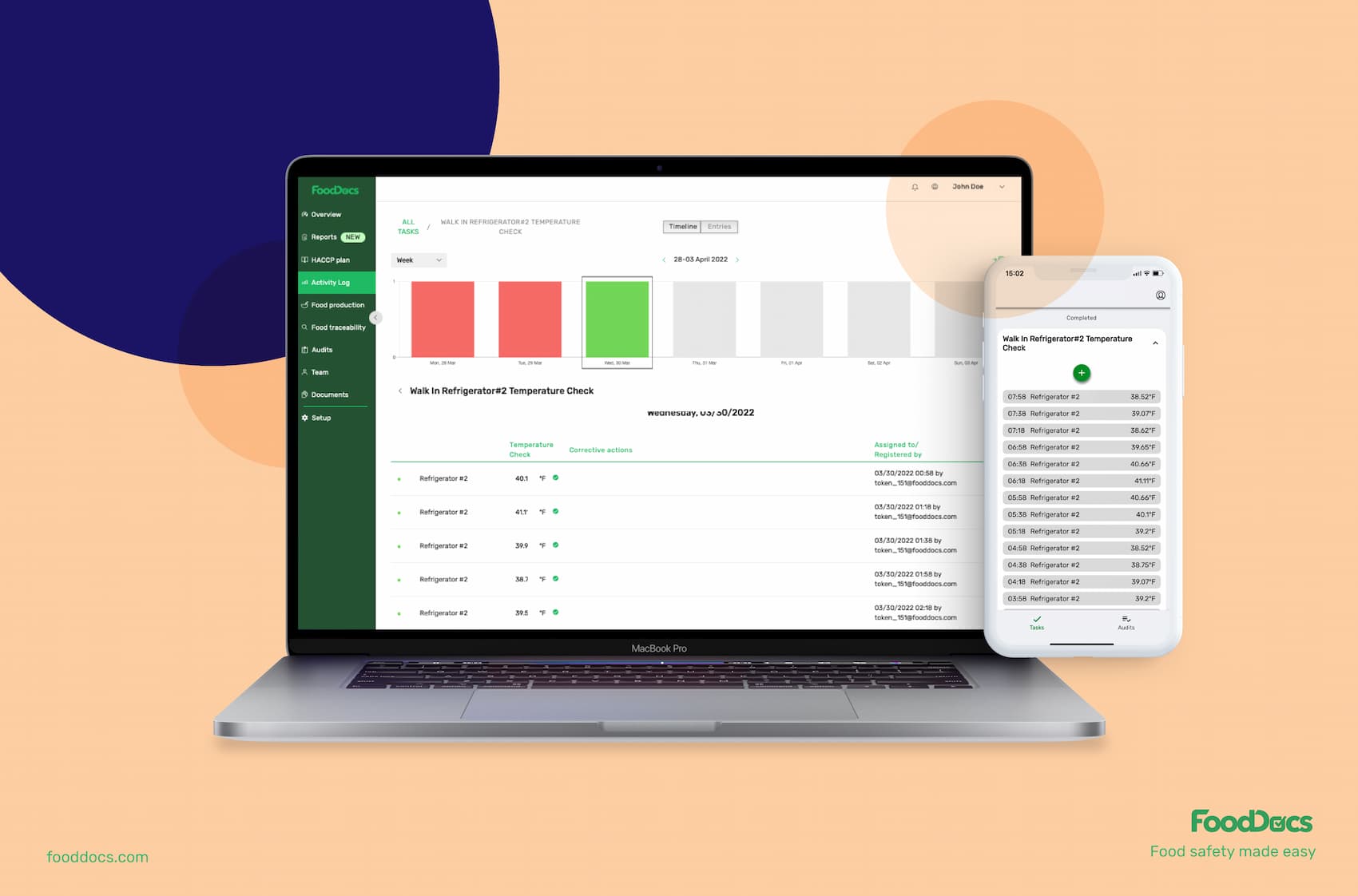
Real-time dashboard from FoodDocs
Setting up your own smart Food Safety Management System using our digital platform only takes 15 minutes. You do not need to be completely tech-savvy to establish this system. All you need to do is answer a few basic questions that will describe your food service nature to our system, and the software will automatically generate the essential food safety features.
You can further customize all logs and checks to incorporate unique operations from your food service business. Maintain compliance and gain more time with the added efficiency you will get using our smart solution.
Enjoy all these features and benefits today by using our free 14-day trial.
Need more information about food service? Here are some of the most frequently asked questions and our answers about food service from the web.
Food service refers to the segment of the food industry that prepares, distributes, and serves foods and services in different settings away from home.
Examples of food service businesses include restaurants, cafes, fast-food chains, food trucks, catering companies, hotels, schools and university cafeterias, hospitals, and other establishments where food is prepared and served to customers.
The job descriptions that are most involved in food service include food preparation, cooking, serving customers, ensuring cleanliness, accounting, planning, business strategizing, managing inventory, and providing customer service.
The food service system refers to the overall process of producing, preparing, distributing, and serving food in a food service establishment. It includes various components such as procurement, storage, food preparation, food safety practices, service, and customer satisfaction.
A food service distributor is an intermediary company that procures, stores, and distributes food products and services to other food service businesses. They also help provide food service resources to establishments like restaurants and food retailers.
Master restaurant sanitizing with clear steps for kitchens and dining areas. Learn methods, checklists, and procedures to keep your team safe and...
Learn challenges healthcare foodservice teams face today and key food safety practices to protect vulnerable patients. Get a free healthcare leader...
Learn what Standard Operating Procedures (SOPs) are and how to write effective SOPs that ensure consistency, efficiency, and safety in your...